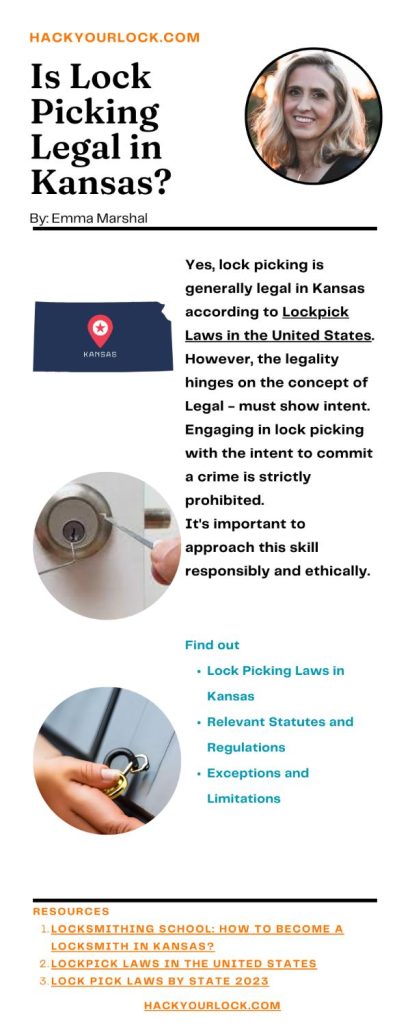Hey, fellow lock pickers and young adventurers! Today, we’re diving into the heart of Kansas, where stories of keys and locks unfold.
Here’s a tale for you: In a quaint town, a group of friends with a passion for lock picking asked, “Is lock picking legal in Kansas?”
Join us on a journey through the sunflower-covered landscapes as we discover the answer and weave our own stories of responsible key exploration.

So, whether you’re a seasoned lock picker or a curious explorer, let’s embark on this adventure together and unlock the mysteries of Kansas!
Contents
Is Lock Picking Legal in Kansas?

Yes, lock picking is generally legal in Kansas according to Lockpick Laws in the United States.
However, the legality hinges on the concept of Legal – must show intent. Engaging in lock picking with the intent to commit a crime is strictly prohibited.
It’s important to approach this skill responsibly and ethically. Additionally, fingerprinting is specifically written into the law, emphasizing the need for individuals involved in locksmith activities to undergo fingerprinting processes.
This ensures a level of accountability and legality in the pursuit of lock-picking knowledge and skills in the state of Kansas.
Lock Picking Laws in Kansas

Lock picking laws in Kansas revolve around the question, “Is lock picking legal in Kansas?” Lock picking laws in Kansas are governed by specific statutes designed to regulate the possession and use of lock-picking tools.
Relevant Statutes and Regulations
Here is the information about relevant statutes and regulations regarding lock picking laws in Kansas presented in a table format:
| Statute/Regulation | Description |
| Kansas Statutes Annotated 21-5807 | Defines the crime of burglary, encompassing unlawful entry into a building with the intent to commit a felony or theft. |
| Kansas Statutes Annotated 21-5801 | Addresses the offense of criminal trespass, involving unauthorized entry onto another’s property. |
| Kansas Statutes Annotated 21-5802 | Defines possession of burglary tools as a crime, encompassing the possession of tools with the intent to use them unlawfully. |
| Kansas Statutes Annotated 75-7c10 | Specifies the requirement for locksmiths to undergo fingerprinting, emphasizing accountability and regulatory compliance. |
Conditions under Which Lock Picking is Considered Legal or Illegal in Kansas
In Kansas, the legality of lock picking depends on certain conditions. Lock picking is generally legal when performed for legitimate purposes, such as regaining access to personal property or with explicit consent from the property owner.
However, engaging in lock picking with the intent to commit a crime, like burglary or theft, is considered illegal. Possession of burglary tools, intending to use them unlawfully, is also deemed illegal.
It’s crucial to approach lock picking responsibly, ensuring it aligns with lawful intentions and respecting the property rights of others in the state of Kansas.
There is a comprehensive article on Is lock picking illegal in the US for detailed information on all states in this regard.
Following table summarizes the key points from Kansas Statutes § 21-2501(a) (4), in Lockpick Laws In the United States.
| Statute | Fingerprinting Requirement |
| Kansas Statutes § 21-2501(a) (4) | Law enforcement agencies are mandated to immediately obtain two sets of fingerprint impressions and one set of palm print impressions from individuals who are arrested and found in possession of burglary tools or other appliances believed to be used solely for criminal purposes. While there is no specific statute prohibiting possession, an individual in possession, upon arrest for any reason, is subject to mandatory fingerprinting. |
Exceptions and Limitations
In Kansas, lock picking is legally permitted for licensed locksmiths, law enforcement personnel, and individuals with explicit property owner consent.
Licensing Requirements of Locksmiths in Kansas
Embarking on the journey to become a locksmith in Kansas doesn’t follow a strict set of rules, but certain keys open doors according to Locksmithing School: How to Become a Locksmith in Kansas?
Locksmiths in Kansas are not required to obtain a license as of August 2022. There is no specific licensing framework for locksmiths in the state.
If you plan to start a locksmith business in Kansas, it is advisable to seek detailed guidance from the relevant Kansas departments, City Hall, or local trade associations for comprehensive information on regulatory requirements and best practices.
To become a locksmith in Kansas, there are no specific requirements aside from being eligible to start a business in the state. Applicants must be 18 years or older, possess sound mental health, and have a good moral and ethical background.
Unlike formal education, no specific degree or training certification is necessary. Key skills include mechanical and mathematical abilities, knowledge of lock components, and proficiency in using locksmith tools.
While a criminal record may not automatically disqualify applicants, a clean background is generally preferred. Obtaining a state-issued business license or one from City Hall is usually required, with professional certifications being recommended.
Penalties for Illegal Lock Picking
Illegal lock picking in Kansas carries significant penalties under state laws. Possessing burglary tools with the intent to use them unlawfully is a criminal offense, leading to potential fines, probation, or imprisonment, depending on the gravity of the situation.
The legal system in Kansas takes a stern stance on such activities, stressing the need for individuals to respect property rights and exercise locksmith skills responsibly.
Offenders may also be subject to additional legal consequences as outlined in the state’s statutes and regulations. It is crucial to approach lock picking with care and adhere to the law.
Do you want to know about similar aspects related to lock picking in other states as well? Other states like California, Arizona, Alaska, Alabama, Ohio, New York, Washington, Florida, Virginia, Colorado, Connecticut, Delaware , Georgia, Hawaii, Iowa, Idaho etc. have also similar regulations.
Conclusion
In conclusion, exploring the intricacies of lock picking in Kansas sheds light on the legal framework and responsibilities associated with this skill. While lock picking is generally legal, individuals must be mindful of the Legal – must show intent concept, emphasizing responsible use.
The presence of fingerprinting in the law adds an extra layer of accountability. As we conclude our journey, the keyword remains clear: “Is Lock Picking Legal in Kansas?” – A question that invites exploration, responsibility, and ethical conduct in the fascinating world of locksmithing.
FAQ’s
Is lock picking legal for personal use in Kansas?
Yes, lock picking for personal use, such as regaining access to your own property, is generally legal in Kansas. However, always ensure your intentions are lawful and responsible.
Can I face legal consequences for possessing lock picking tools in Kansas?
Yes, possessing lock picking tools with the intent to use them for unlawful purposes is illegal in Kansas and may result in fines, probation, or imprisonment.
Are there age restrictions for learning lock picking in Kansas?
There are no specific age restrictions for learning lock picking. However, it’s crucial for individuals, especially minors, to use this knowledge responsibly and under proper guidance.
Resources
- Locksmithing School: How to Become a Locksmith in Kansas?
- Lockpick Laws In the United States
- Lock Pick Laws by State 2023
